Joe Rogan’s supplements list helps him maintain better physical shape than most 30-year-olds.
And it’s not just his physique that’s impressive; Rogan’s supplements are also helping him stay mentally sharp, which is essential for hosting The Joe Rogan Experience podcast.
Whether Joe Rogan is injecting testosterone, devouring elk meat, or drinking CBD, the Onnit supplements co-founder is always on the lookout for science-backed supplements for his latest stack.
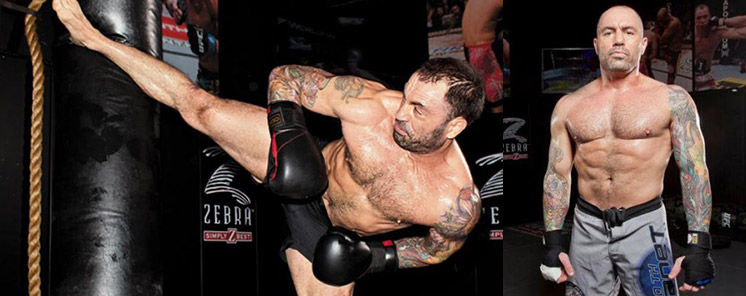
What supplements does Joe Rogan take? Here is the list of supplements Joe Rogan takes regularly, occasionally, or is currently experimenting with:
- Multivitamin – Athletic Pure Pack – Supplements for Daily Vitamins
- Macular Support Formula – Supplements for Vision / Eye Support.
- Glucosamine Chondroitin & MSM – Supplements for Cartilage & Joint Support
- Super Omega-3 Fish Oil – Supplements for Heart Health
- Vitamin D – Supplements for Respiratory Support
- Resveratrol & NMN – Supplements for Longevity
- Alpha Brain Black Label – Supplements for Productivity
- Shroom Tech Sport – Supplements for Endurance
- Alpha Brain Pre-workout – Supplements for Energy Production
- Kratom – Supplements for Pain Management
All updates to Joe Rogan’s supplements list are tracked on this change log.
Joe Rogan Supplements for Daily Vitamins

From this old video clip, it’s evident that Joe Rogan used to incorporate a wide array of supplements into his routine.
However, in his recent podcasts, he seems to have opted for a more streamlined approach.
Multivitamin
Rogan now mentions using a multivitamin product called Athletic Pure Pack from Pure Encapsulations – which conveniently comes in ‘on the go’ sachets, as he highlighted in his Instagram post.
Each sachet of Athletic Pure Pack multivitamins contains a specific number of supplement pills, including:
- Vitamins & Minerals (3x)
- Creatine – Kre-Alkalyn (2x)
- EPA/DHA Omega-3s (1x)
- Vitamin C – Ascorbic Acid (1x)
- Coenzyme Q10 (1x)
- L-Glutamine (1x)
You can find the mention of Athletic Pure Pack supplements in the #802 podcast episode of Joe Rogan with Tom Papa, available on Spotify.
Their conversation on supplements starts around the 1-hour 8-minute mark, and the specific reference to Athletic Pure Pack occurs at 1:14:37.

^ Short video clip of Joe Rogan discussing his use of Athletic Pure Pack Multivitamins
For individuals seeking a straightforward multivitamin option without additional additives, Pure Encapsulations offers a product known as O.N.E.
This particular multivitamin supplement is favored by Dr. Rhonda Patrick, a frequent guest on Joe Rogan’s podcast.
For a more in-depth conversation about O.N.E, you can refer to Dr Rhonda Patrick’s supplements discussion as highlighted in the mentioned post.
Joe Rogan Supplements for Vision / Eye Support
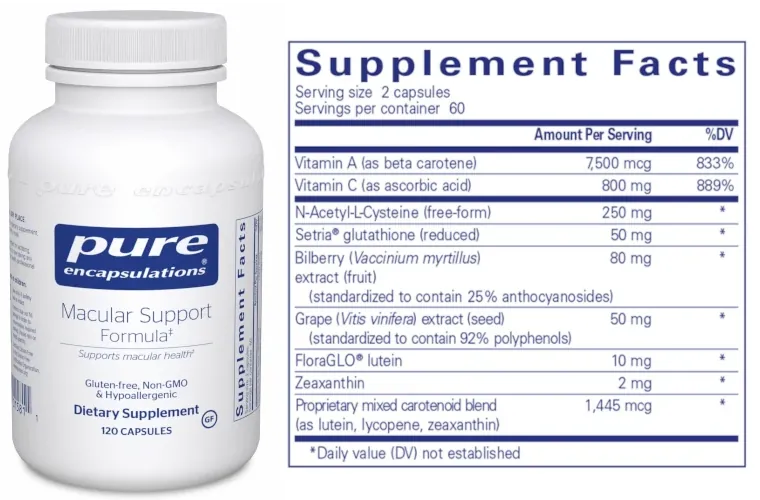
Even for those with good eye sight, the ability to see objects up close begins to diminish from our mid 40s onwards – known as presbyopia.
Macular Support Formula
In order to try and slow the decline, Joe Rogan started taking a supplement by Pure Encapsulations called Macular Support Formula. It compiles a number of vitamins and plant extracts that may support eye health.
In the below clip he mentions how he thinks it helped:
^ Clip from JRE #1879 – see section 115:09
Joe Rogan Supplements for Cartilage & Joint Support

Since Joe Rogan was young, he trained as a Taekwondo fighter, competing nationally. Even after he finished fighting competitively, he still trains hard.
This leads to a lot of wear and tear on the joints, and thus Rogan uses glucosamine and chondroitin supplements.
Glucosamine & Chondroitin
He first mentioned glucosamine and chondroitin in a 2009 post on MMA underground (original forum no longer available):

Then in his 2011 supplement cupboard video, he shows that he’s using 365s Glucosamine Chondroitin & MSM. This product isn’t always well stocked, so a similar alternative is NOW’s Extra Strength Glucosamine & Chondroitin.
Joe Rogan Supplements for Heart Health

Joe Rogan places a high value on omega-3 fish oil supplements, and ensures he’s taking them regularly. In the same Tom Papa podcast above, you can skip to 1:02:40 where they talk about the importance of fish oils, and how it’s more effective than getting your omega-3s from flax-seed or hemp oil.
Super Omega-3 Fish Oil
Based on Rogan’s Instagram post, the old video tour of his vitamin cupboard, and a recent Dr Rhonda Patrick podcast, Rogan currently takes Carlson’s Super Omega-3 fish oil in liquid form.
He currently takes 3 tablespoons daily (he specifically mentions this dosage in a recent podcast with Rhonda Patrick).
If you find capsules more convenient (as I do), Carlson also do an encapsulated version; Carlson Super Omega-3 Gems. A 2 capsule serving contains 1,200mg omega-3s, including 600mg EPA & 400mg DHA.
Joe Rogan Supplements for Respiratory Support

Joe Rogan recently had Dr Rhonda Patrick on the show (#1474), and they did a deep dive into research around vitamin D supplements and their benefits. Particularly in regard to reducing the risk of respiratory tract infections.
Rhonda pointed to a possible link between low vitamin D levels, and increased severity of Covid-19 disease.
Vitamin D
Both Rhonda and Rogan shared that they’re taking 5,000 IU of D3 daily. Specifically, Rhonda aims to maintain a blood concentration of 40 – 60ng/ml, using occasional blood tests to calibrate the correct amount of D3 she needs.
Rhonda points out that not only is too little D3 bad for us, too much is also not good. See her video on Vitamin D3 for more details.
Last time Rogan mentioned which D3 supplement he used, he was taking Solgar’s D3 5,000 IU (see old video clip of his supplement cupboard). However, this was from way back in 2011!
Other reputable brands of vitamin D3 include:
- Thorne 1,000 IU capsules and 5,000 IU capsules
- Life Extension 1,000 IU capsules and 5,000 IU capsules.
Joe Rogan Supplements for Longevity
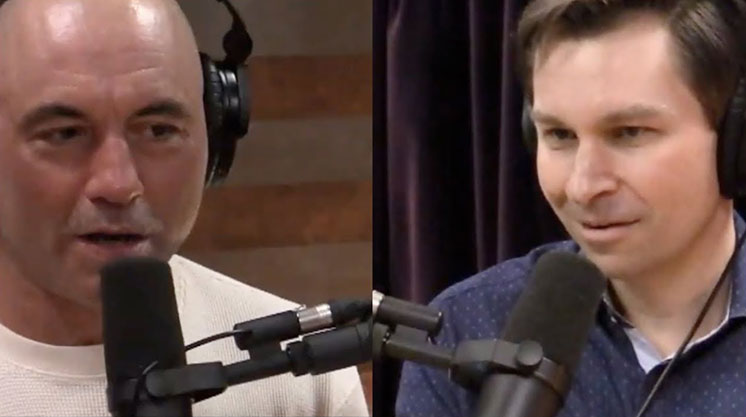
On podcast episode #1234 Joe Rogan had a Harvard scientist called David Sinclair on to discuss supplements.
David shared the longevity supplements he takes, including:
- Resveratrol – 1g/daily (morning with yogurt)
- Nicotinamide Mononucleotide (NMN) – 1g/daily (in capsules, swallowed with water)
During the podcast Rogan creates a list of these supplements to go shopping for later.
Then on episode #1269 Rogan confirms he has started taking Resveratrol every morning, along with NMN which he says gives him a lot of energy and makes him feel great.
What do Resveratrol & NMN do in relation to living longer?
David describes resveratrol and NMN as critical for the function of the sirtuin genes, genes which help us live longer. He describes resveratrol as the “accelerator pedal” for the sirtuin genes (increasing their activation), and NMN as the fuel.
The reason that resveratrol won’t work effectively without NMN (the “fuel”), is that sirtuin activation requires youthful NAD levels, but NAD levels decline with age, and by 50 years old, we have about half the level of NAD we had in our 20s (NAD being a molecule that is essential to energy production in our cells).
So in effect, you take resveratrol to increase activation of the sirtuin genes, and NMN to ensure the sirtuins have enough energy to work properly. It’s worth noting that restoring NAD levels has other helpful benefits too.
The complexity with these 2 supplements is that David Sinclair (who recommended them), uses product he had leftover from lab experiments – and Rogan hasn’t shared explicitly which brand he uses (and no doubt brand matters, given that supplement manufacturers are unregulated).
I dug into the subject in detail in the David Sinclair post, so refer to that for more details, but below is shorter version.
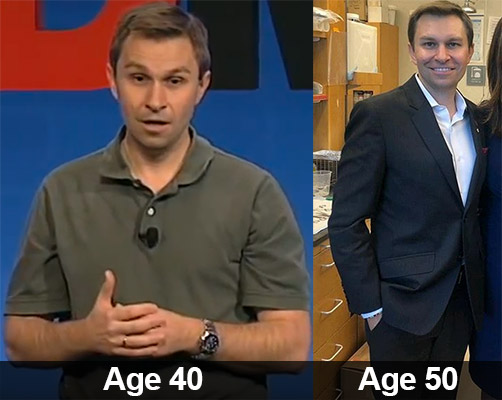
Research published by David’s old company Sirtris (sold to GSK for $720m) found that micronized resveratrol had greater bioavailability than its regular, non-micronized counterpart, specifically up to 3.6x greater when measured in the blood.
Resveratrol
We see this with other molecules too; where reducing particle size increases bioavailability.
For example with curcumin, whose absorption can be improved through micronization (for example Theracurmin). So this makes sense.
Micronized resveratrol options include:
| Product | Price per gram | 3rd Party Analysis Certificate? |
| Capsules | ||
| Mega Resveratrol (99% purity) - 500mg capsules x120 | $1.50 per gram ($90 / 60g) + 10% coupon code | Micro Quality Labs CoA - April 2022 |
| ProHealth (99% purity) - 500 mg capsules x60** | $1.03 per gram ($31 / 30 g) + 10% coupon code | Twin Arbor Analytical CoA - March 2023*** |
| Powder | ||
| Mega Resveratrol (99% purity) - 60 grams | $1.25 per gram ($75 / 60g) + 10% coupon code | Micro Quality Labs CoA - Dec 2021 |
| ProHealth (98%* purity) - 30 grams | $1.16 per gram ($35 / 30g) + 10% coupon code | Twin Arbor Analytical CoA - Feb 2023*** |
| ProHealth (98%* purity) - 100 grams | $0.76 per gram ($85 / 100g) + 10% coupon code | Twin Arbor Analytical CoA - Jan 2023*** |
Note: Whichever source of trans-resveratrol you take, according to David, you will increase its bio-availability if you take it with a fat source.
David takes it on an empty stomach in the morning, so mixes it with a bit of yogurt. However it should also be possible to take it with a meal containing fat.
NMN (Nicotinamide Mononucleotide)
In the interview David refers to two molecules that can act as “gas” for the sirtuin activator (resveratrol) to work; NMN and NR (nicotinamide riboside).
It’s not clear yet how NR compares to NMN in terms of effectiveness – those studies are still to be done.
However, David speculates based on the animal studies done so far that NMN may turn out to be the superior molecule in terms of raising NAD levels in cells.
When it comes to NR, there is already a clear brand leader in the space; Chromadex Tru Niagen. It’s Chromadex’s NR that also goes into other brand’s NR offerings such Life Extension’s NR.
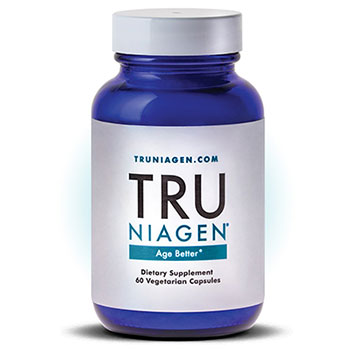
However when it comes to NMN, there isn’t a clear brand leader.
Searching online there are a large number of possible options. Without doing ones own 3rd party lab testing, it’s hard to evaluate the quality of products.
What I’ve done below is put some of the more highly reviewed options into a table, calculated the approximate price per gram, and added links to any 3rd party analysis certificates the companies display.
| Product | Approx. price per gram | 3rd Party Analysis Certificate? |
| Capsules | ||
| SuperNMN - 500 mg capsules | $1.51/gram ($68 / 45g) | Micro Quality Labs CoA - May 2022 |
| Renue - 125 mg capsules | $2.30/gram ($68 / 30g) + 10% off coupon code | Micro Quality Labs CoA - March 2023 |
| RevGenetics - 500 mg capsules | $1.33/gram ($40 / 30g) | Summit Labs CoA - June 2023 |
| ProHealth - 500 mg capsules | $3.33/gram ($100 / 30g) + 10% off coupon code | Twin Arbor Analytical CoA - Feb 2023 |
| Powders | ||
| Renue - 100 grams |
$0.67/gram ($67 / 100g) + 10% off coupon code | Micro Quality Labs CoA - June 2023 |
| ProHealth - 100 grams |
$1.23/gram ($123 / 100g) + 10% off coupon code | Twin Arbor Analytical CoA - Sept 2022 |
| SuperNMN - 30 grams | $1.66/gram ($50 / 30g) + 10% off coupon code | Micro Quality Labs CoA - May 2022 |
| ProHealth - 30 grams |
$2.66/gram ($80 / 30g) + 10% off coupon code | Twin Arbor Analytical CoA - Sept 2022 |

For further information on the topic of Resveratrol and NMN, see our longer post on David Sinclair’s Supplements – including additional information we’ve learnt since David was on JRE.
Joe Rogan Supplements for Productivity

During Joe Rogan’s interview with Andrew Huberman (at 12m 49s of the episode) he mentions he’s been taking Alpha Brain Black Label nootropic supplement for the last 6 months and has found it beneficial.
Alpha Brain Black Label
Initially there was just 1 version of Alpha Brain, but since mid 2021 they’ve released a Black Label version.

Comparing the ingredients, there are 3 common ingredients:
- L-Theanine
- Phosphatidylserine
- Toothed Clubmoss (Herpzia serrata)
Beyond those, the ingredients are quite different:
- The original version was notable amongst nootropics for not including caffeine, however the Black Label version contains 25mg caffeine per dose.
- Black Label uses citicoline, compared to Alpha GPC in the original. These are both forms of the nutrient choline – and each has its strength and weaknesses.
- Black Label adds Lion’s Mane, which has been shown to increase brain derived neurotrophic factor (BDNF). This can support the growth of nerve cells in the brain.
- Black Label adds Lutein, which is a nutrient supporting healthy eye sight.
- Black label adds mucuna pruriens, which contains L-Dopa, the pre-cursor to dopamine. It can provide a short term boost in mood and feelings of wellbeing. However, it’s unclear if you’d want to be taking this every day.
So as you can see, Alpha Brain Black Label appears to be a go-to nootropic for Joe Rogan these days. You can get 10% off Onnit products (including Black Label) with this coupon code.

^ Short video clip of Joe Rogan discussing his use of Alpha Brain Black Label
Nootropics
Prior to the release of Alpha Brain Black Label, in 2019 Rogan discussed the 3 nootropic supplements he takes:
In a January 2019 podcast episode (JRE #1234 ), Rogan discussed the 3 nootopic supplements he likes & takes; Neuro1, TruBrain & AlphaBrain.

^ Short video clip of Rogan talking about the 3 different nootropics he takes
“There’s a bunch of different nootropics I use. I use 3 different companies, 1 that’s one of mine (AlphaBrain), and then 2 that are other companies; Neuro1 and another one called TruBrain”
Neuro1

Rogan has mentioned Neuro1 numerous times over the years (for example see his below tweet from 2013). It’s a nootropic created by former NFL linebacker Bill Romanowski, who after 16 years, and many hits in the NFL, was suffering from memory problems.
In 2007 he brought together doctors, scientists and nutritionists to create a solution to fix his cognitive decline. This resulted in the product Neuro1.
More about Romanowski and the creation of Neuro1 here, and the product’s website link here.
Note: Whilst Neuro1 lists ingredients, it doesn’t list quantities (not good). Their website says “one serving of Neuro1 is equivalent to about 1 cup of strong coffee”, so around 100mg to 120mg of caffeine per serving.

TruBrain

Rogan interviewed the neuroscientist behind TruBrain, Dr Andrew Hill, on JRE #629. Similar to Neuro1 above, it shares active ingredients caffeine and piracetam, but then adds oxiracetam to the stack.
TruBrain come in these “on the go” pouches, that work out to be a couple of dollars per dose.
AlphaBrain


AlphaBrain is made by Onnit, a company that Rogan openly explains he owns a stake in. He also notes that all the supplement’s ingredients could be bought separately for less, it would just require more time and effort.
There are two versions; pill form (Alpha Brain) and sachet form (Alpha Brain Instant). In case it’s of use, for 10% off Alpha Brain (and anything else at onnit.com) you can use this coupon code.
Unlike Neuro1 and TrueBrain, AlphaBrain doesn’t include caffeine. It’s active ingredients include:
- Alpha GPC
- Bacopa
- Huperzine A
- Vinpocetine
- L-theanine
Alpha GPC, a type of choline, is also favoured by Dr Rhonda Patrick, a regular guest on Rogan’s podcast. She takes around 800mg (substantially more than 2 capsules of Alpha Brain contains) before intense writing or public speaking events. See more on Rhonda’s use of it here.
Interestingly, Onnit did sponsor a 63 person study (source) showing that Alpha Brain improved “delayed memory recall” vs a placebo. Specifically that’s where participants are told/shown something, then a break occurs, then they’re later asked questions that requires them to recall the information they were earlier provided.
Now, given that Onnit sponsored the study, we should use appropriate scepticism in interpreting their positive results; but thought it interesting to mention nonetheless.
Rogan talked about his Onnit “essentials” including Alpha Brain and Shroom Tech Sport on Instagram – August 2019.
Joe Rogan Supplements for Endurance

Joe Rogan has previously mentioned 2 supplement products from the Onnit range that he likes for pre-workout:
Again, it’s worth pointing out that Rogan owns equity in Onnit, and thus may be biased.
Shroom Tech Sport
Joe says he takes Shroom Tech Sport as a pre-workout supplement, about an hour before exercising.
In an interview with Aubrey, they discuss how it’s an unusual pre-workout, because it’s not reliant upon stimulants like caffeine, which most pre-workouts are.
Rogan says it allows him to push harder in the gym, without giving him the jittery feeling that strong caffeine based pre-workout supplements do.


It contains a number of interesting ingredients:
- Cordyceps mushroom – this is the main ingredient, and the one that puts “shroom” in the name. It’s regarded as being energizing, however the human study data is still limited.
- Green tea extract – this will mean the supplement contains caffeine and l-theanine, which come from tea leaves.
- Rhodiola – popular “adaptogen” – supposed to boost energy.
- Vitamin B12 – important for energy production, but the effects are typically only noticeable if you’re low in B12.
- Chromium – thought to play a role in insulin regulation1A scientific review: the role of chromium in insulin resistance – PubMed 2004 which in turn is important for the bodies’ management of energy.
- Ashwagandha – an “adaptogen” that appears particularly adept in helping manage stress/anxiety2A Prospective, Randomized Double-Blind, Placebo-Controlled Study of Safety and Efficacy of a High-Concentration Full-Spectrum Extract of Ashwagandha Root in Reducing Stress and Anxiety in Adults – K. Chandrasekhar et al – 2012.
- Astragalus – has been researched as a drug to improve healthspan – unclear how it helps with sports performance.
Onnit also published a clinical trial that found Shroom Tech Sport increased volume for strength training and high-intensity cardio. Here is the full study, and their blog post about it. Naturally, given it was self-funded, it should be approached with healthy skepticism.
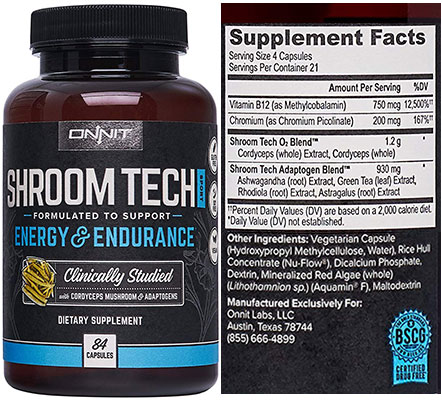
In case it’s of use, for 10% off Shroom Tech Sport use this coupon code.
Joe Rogan Supplements for Energy Production

Alpha Brain Pre-Workout supplement was first released in January 2023, and around April 2023 Rogan said on Instagram it’s “his new favourite pre-workout”.

Whereas Shroom Tech Sport might give a nice boost for those who don’t want extra stimulants, Alpha Brain Pre-Workout utilizes caffeine to act as a stimulant.
Alpha Brain Pre-workout
It contains 200 mg of caffeine per dose. For perspective, an 8.4 fl. oz. can of Red Bull contains 80 mg, and a 16 fl. oz. can of Monster contains around 160 mg of caffeine.
For 10% off Alpha Brain Pre-Workout, use this coupon code.
Joe Rogan Supplements for Pain Management

Joe Rogan first mentions learning about Kratom in 2016, on episode #843, then later that year he mentions trying it for the first time on Twitter (link).

Then in 2018, episode #1136 he shares with Hamilton Morris that he’s on Kratom while they speak – to help curb the pain of a recent knee injury (see clip).
Then later on #1296 he discusses the effect of different doses, with smaller doses being a stimulant, and higher doses being a relaxant (see clip).
Kratom

^ Left: dried, ground kratom leaf. Right: the kratom plant (Mitragyna speciosa)
Kratom is the powdered leaves of a plant from SE Asia called Mitragyna speciosa (you can see why the simpler name “kratom” caught on). It has 2 main properties:
- At lower doses, it acts as a mild stimulant
- At higher doses, it acts as a pain-killer
It’s most commonly used for 2 issues:
- Beating opioid addiction – whether that’s from “street drugs” like heroin, or from prescription drugs like OxyContin.
- Chronic pain management – as an alternative to prescription drugs.
Other, less common, uses include:
- Social anxiety – helping users to feel more confident and relaxed in social situations
- Bodybuilding – to help train longer and harder in the gym
Kratom types?
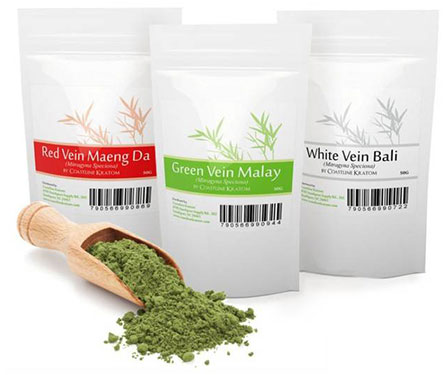
Similar to the way all types of tea we drink (black, green, white etc) are derived from the same species of plant; camellia sinensis, all types of kratom are derived from a single species of plant also – called mitragyna speciosa.
Often kratom gets segmented into 3 colors: red, green and white. The colors refer to the veins within the leaves. However, during processing the veins and stems are cut out, so that what you receive all looks similar; a green ground-up powder.
Then within each color the products are often further segmented, in order indicate subtle differences between the plants. For example, popular red kratoms are Bali, Borneo and Maenga Da. For more information on kratom strains, see this post on reddit.
Is Kratom addictive?
Even though kratom is a “natural” product, it can still be addictive, particularly if taken daily. For people who are dealing with chronic pain, then this is less of an issue, given they may need to take addictive pain killers daily anyway.
However, when used recreationally, addiction is something to watch out for. There’s a good video on the Psyched Substance YouTube channel here, about the risks of kratom addiction. There is also a thread on Reddit around how to quit (suggesting it’s not easy once addicted).
Is Kratom legal?
Kratom’s legal status varies from country to country, and you should be aware of the status where you are. In the USA kratom is federally legal, but some individual states and cities have made it illegal.
For example, it’s legal within California except for in the city of San Diego. There has been discussion (link) to make kratom federally illegal, but this has not happened so far.
For the USA, this map on speciosa.org shows the legal status in different states and cities. For other countries, this reddit post has more details.
Where to buy Kratom?
Assuming kratom is legal in your location (see above) then kratom can be purchased both in head shops and via online stores.
Joe Rogan: Further Reading

Joe Rogan’s Testosterone Replacement Therapy (TRT) Protocol
Above we’ve looked at the vitamins and supplements Rogan takes to keep himself in top form. However, we’d be remiss if we didn’t mention Joe’s use of Testosterone and Human Growth Hormone – which have a big impact on his health and vitality.
For the full details, see this separate post:
Joe Rogan: Hemp/CBD Oil

Joe Rogan explains he uses hemp oil in 2 different forms:
- As an oil taken orally – he says it “puts me in a great place”. Specifically mentioning how it has “saved family vacations” by reducing his anxiety.
- As a cream used topically – Rogan exercises a lot, and says “it’s probably the best thing I’ve found for alleviating soreness and stiffness”
Other supplement lists:
If you liked Joe Rogan’s supplements list, you may also find these supplement lists from his podcast guests interesting:
- Andrew Huberman Supplements List (with Dosage) 2023
- David Sinclair Supplements List
- Dr Rhonda Patrick Supplements List
Let us know in the comments if you’ve any questions.
References
- 1
- 2